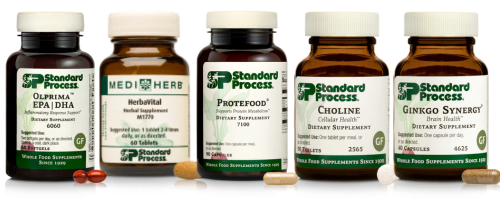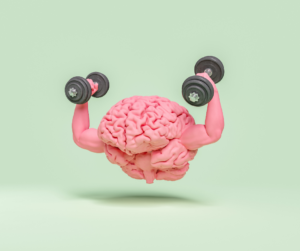Have you been feeling like your head is stuck in a fog? Is it hard to concentrate or think clearly? When you can’t string two thoughts together or remember important details, it’s frustrating – and worrying! But – brain fog doesn’t have to be part of your daily life. There are several easy steps you can take to improve your overall brain health and feel like you can think again.

Get Enough Sleep
It’s no big secret that a good night’s sleep is essential for optimal health. When we sleep, our brains process, store, and consolidate memories that occurred during the day. In addition, detox mechanisms work on clearing any excess toxins. When we don’t get enough sleep, our brains don’t have time to do these jobs efficiently. This leaves us feeling groggy, forgetful, and unable to focus.
A good rule of thumb is to aim for 7-8 hours of sleep and try to establish a consistent sleep schedule. It is best to avoid using any electronic devices before bed. The blue light can cause your brain to think it’s still daylight, interfering with melatonin production. Instead, try to create a sense of “dusk” about an hour before you go to bed. Do this by dimming the lights and turning off all screens. You can allow your body to wind down with a relaxing activity, like reading a book or taking a warm bath. You may also like to diffuse a relaxing essential oil, like Lavender or Sandalwood, or a similar blend like Serenity from Doterra.
Include More Brain Food in Your Diet
Our brains require certain nutrients to maintain peak performance and perform complex functions including memory, attention, problem-solving, and decision-making. In order for these actions to take place, the brain needs a steady supply of nutrients obtained from the food we eat.
One such nutrient obtained from dietary protein is essential amino acids. These are used to produce important neurotransmitters, the chemical messengers that allow our brain cells to talk to each other. In addition, our brains require adequate B vitamins, Vitamin E, and iron to support nerve cell development, energy metabolism, and antioxidant defense.
As you might assume, a diet high in processed foods, sugars, and unhealthy trans fats can lead to brain fog, unclear thinking, and even fatigue. Other negative consequences from these types of food can include accelerated inflammation, heart disease, diabetes, and more.

So, what kinds of foods are best to optimize brain health?
Foods Good for Brain Health Include:
- Plenty of fruits and vegetables that are rich in antioxidants to nourish and protect your brain.
- High-quality plant and animal proteins which are rich in the nine essential amino acids.
- Sufficient water to maintain optimal hydration – shoot for ½ your body weight in ounces every day.
- Fatty fish such as salmon, mercury-free tuna, and sardines – rich in Omega-3 fatty acids.
- Berries also contain high amounts of antioxidants along with flavonoids which have been shown to improve cognitive function.
- Key mushrooms like Lion’s Mane to improve cognitive function and optimizing brain health.
- Walnuts and pumpkin seeds are rich in Vitamin E, fiber, and protein.
- Eggs are a good source of choline, a superfood when it comes to brain development and cognitive function.
- Dark chocolate – as bitter as you can find – contains a generous amount of flavonoids, which also protect brain health.
Without a steady supply of these nutrients, the brain can’t function at its best. A deficiency of these important nutrients can lead to cognitive impairment, memory problems, and mood disorders. Over time, a diet that is missing these foods could lead to neurodegenerative diseases like Alzheimer’s and Parkinson’s. By consuming a balanced diet rich in whole foods, we can ensure that our brains have the nutrients they need to function at their best.
Supplements to Fill the Gaps

Of course we try, but we can’t always be perfect with our diet. Especially with traveling and balancing busy work and family schedules, our diet can take a hit. That’s where key supplements come in…
- A good fish oil like Olprima EPA/DHA or Tuna Omega 3 Oil is a foundational first step towards better brain health.
- Herbavital – our most potent blend of herbal antioxidants, with ingredients from Japanese Knotweed, Milk Thistle, Korean Ginseng, Grape seed and Ginkgo leaf. Highly recommended for healthy aging.
- Protefood as a source of amino acids – these are proteins that are already digested for you and easy for your body to absorb.
- Choline is a great addition to your protocol because it does double duty: an awesome B vitamin for your brain health, plus liver cleansing benefits to promote detoxification.
- Ginkgo Synergy is a blend of Ginkgo Biloba (for oxygenation and circulation) with Grapeseed extract (for antioxidants).
You can mix and match your favorites and see how much better you feel!
Get Your Body Moving
Regular physical exercise isn’t just good for your body – it’s essential for maintaining a healthy and happy brain. Not only can exercise deliver important nutrients to the brain through improved blood flow, but when you move, your body produces important neurotransmitters such as dopamine and serotonin which improve your mood – and your memory.
A good rule of thumb when it comes to exercise is to aim for at least 30 minutes of moderate exercise 3-4 days each week. This can include brisk walking, cycling, pickleball, or other activities you enjoy. You can also try incorporating more movement into your daily routine, like taking the stairs instead of the elevator or going for a walk during your lunch break.

Manage Your Stress
The negative impact of chronic stress on our overall health can’t be overemphasized enough.
When we’re under chronic stress, our bodies produce a hormone called cortisol. When we get excessive amounts of cortisol, this has a detrimental impact on the hippocampus in the brain. The hippocampus is your short-term memory center. When it’s being pounded by cortisol, this can impair brain function and lead to symptoms like brain fog, memory problems, and difficulty concentrating. One of our favorite herbal blends precisely for this situation is Bacopa Complex. This combination of herbs works to relax your stress responses, and also protect the hippocampus so can keep your head on straight. It’s our favorite blend to take prior to public speaking!
In addition, activities such as yoga, meditation, deep breathing, and other relaxation techniques can boost your cognitive function and reduce stress all at the same time.
Learning how to manage your stress can help reduce the impact it has on your brain and improve your overall cognitive function.
Brain Gymnastics
Just like our bodies need exercise to stay as healthy as possible, our brains need exercise too. Engaging in activities that challenge your brain, like learning a new language or playing a challenging game, can help improve cognitive function.
Learning a new skill, solving crossword puzzles, or playing a strategic game (like Spades!) will put your brain into action, forcing it to stay active and remain sharp. Other brain-building activities include taking a cooking class, learning how to paint, or dancing the tango!
Just get out there and do something fun that you enjoy!

Sharper Focus is Within Reach
Brain fog can be a frustrating and debilitating symptom, but you can do something about it. By taking a holistic approach, you can improve your cognitive function, sharpen your focus, and reduce the symptoms of brain fog. Try to incorporate at least two of these tips into your daily routine, and watch as your brain becomes clearer, sharper, and more resilient.
Of course, there are certain medical conditions that need to be addressed if this is the underlying reason you’re feeling foggy. You may need to do some advanced testing – things not normally done in your GP’s office to figure this out. The most common conditions we see are:
- Hypothyroidism
- Menopausal decline in estrogen and progesterone
- Heavy metal toxicity
- Mold toxicity
- Yeast and fungal overgrowth
- Autoimmunity
- Infection
Still need help? Reach out for a personalized consult, and let’s see if we can identify something more specific that needs attention.
We are here for you when you need us!


